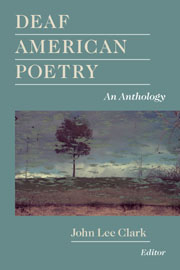|
An Anthology
John Lee Clark, Editor View the table of contents. $35.00s print edition |
Shopping Cart Operations
Add to Cart |
From Prick of the Spindle
Under all speech that is good for anything there lies a silence that is better.
The exciting new anthology of Deaf American poets edited by John Lee Clark, Deaf American Poetry: An Anthology, contributes a poetics that fills a void in contemporary poetry appreciation—that of the verse of culturally Deaf American poets. As the accomplished poet and editor John Lee Clark points out in the Editor’s Note, the culturally Deaf are considered to be those who identify themselves with the Deaf community. “Collectively,” Clark writes, “the poems tell the story of the signing community’s development and how Deaf people struggled against oppressive forces to discover more about themselves and to celebrate who they are.” Indeed, the nearly 300-page volume provides a comprehensive history which is revealed in the biographies of the Deaf poets within. Their accomplishments, as well as the writing that is informed by the adversities they faced and continue to face, are a flagship contribution to American poetry as a whole.
It can be argued that poetry is partially about intent and should transcend its medium—both in the way that it is appreciated and in how it is received and interpreted. Contributing to this idea is the provocative statement by Clark in the book’s introduction, which asserts that, “Breaking the most ground are the Deaf poets who do not write. After all, writing is not native to Deaf culture as is signing. They make poetry out of handfuls of air; their lexicon is cinematic, giving rise to a new poetics.” Clark’s point is underscored by the poets, some of whom are included in this volume, whose writing stems primarily from American Sign Language (ASL). When such work is interpreted, or translated, it is done so and should be read with the understanding that, in this case, the written word is a somewhat inferior incarnation of the original, more expressive version.
Beginning with the poet John R. Burnet (1808-1874) and ending with Alison L. Aubrecht (b. 1979), a history is traversed whose beginnings exhibit a Deaf poetry whose origins “pander to a hearing audience” but whose development over the centuries has been increasingly informed by awareness, pride and the heightened sensibility of Deaf culture as valid and deserving of recognition. While Burnet’s poem “Emma” depicts the Deaf as caged, suffering creatures, the poet James Nack (b. 1809) concluded in a poem written later in his career, “I pity those who think they pity me.” The notion of the hearing that the Deaf are poor souls in need of sympathy is a commonly-addressed theme in Deaf poetry.
Another recurring topic is the idea of musicality. Over any sort of audible music, the importance of the visual is stressed, which is often the source and essence of beauty. James Nack’s poem, from which the quote above is excerpted, is in fact titled, “The Music of Beauty.” Deaf poets, especially those writing within the Romantic period, experienced the discovery of a music that transcended anything that could be heard with the ears. Nack rightfully turns the concept of such music, as interpreted by the hearing, on its head. His poem goes on to illustrate the loveliness contained in the harmony of beauty in the woman he adores. Mary Toles Peet, a contemporary of Nack and Burnet, writes in her “Thoughts on Music,” “the music of my inward ear / Brings joy far more intense.” J. Schuyler Long’s poem, “I Wish That I Could Tell,” illustrates this point clearly:
And I wish that I could tell them
Of the music that I see
In the buds of spring unfolding;
And the moving melody
In the motion all about us,
In the birds and in the flowers
In the happy eyes of children
As they look their love in ours.
Rex Lowman’s poem, “Beethoven,” celebrates a similar idea, as does, notably, “On His Deafness” by Robert F. Panara.
John Lee Clark is a poet and writer in Burnsville, MN.
Print Edition: ISBN 978-1-56368-413-5, 6 x 9 paperback, 312 pages
$35.00s
E-Book: ISBN 978-1-56368-455-5
$35.00
To order by mail, print our Order Form or call:
TEL 1-800-621-2736; (773) 568-1550 8 am - 5 pm CST
TTY 1-888-630-9347
FAX 1-800-621-8476; (773) 660-2235
